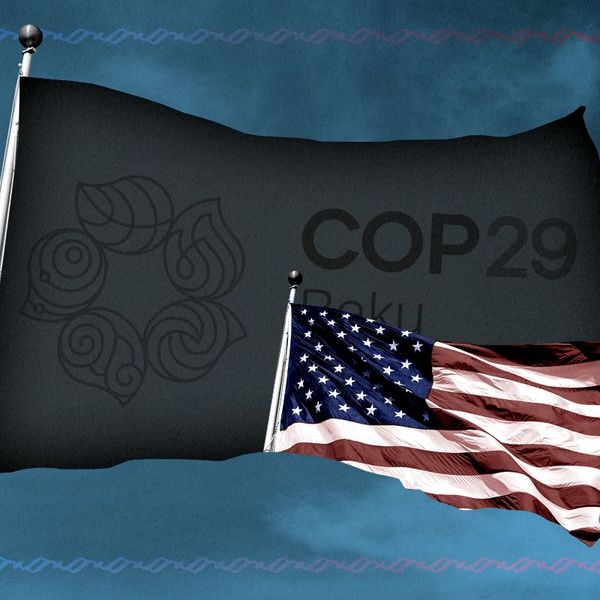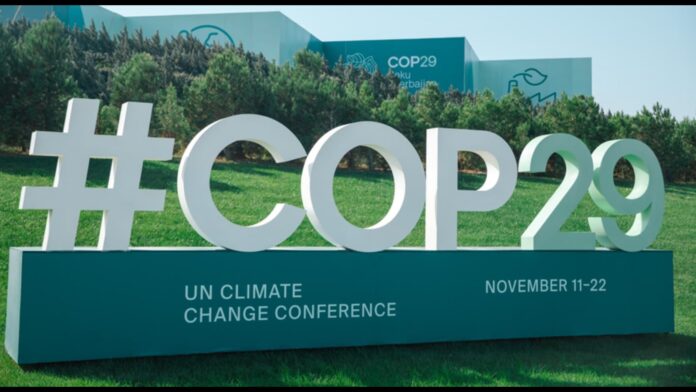The 29th United Nations Climate Summit opens in Baku under the shadow of U.S. political shifts and dire climate warnings, with calls for urgent global action and increased financial commitment from wealthy nations.
COP 29; A Climate Summit Under Pressure.
The 29th Conference of the Parties (COP29) commenced in Baku, Azerbaijan, with a sense of urgency and unprecedented challenges. As climate negotiators and global leaders gathered to discuss critical measures to counteract global warming, the United Nations issued a stark warning that the goals of the Paris Agreement are “in great peril.” Amid predictions of record-breaking global temperatures and extreme weather patterns, the summit aims to push wealthy nations to meet their climate financing promises. However, the recent re-election of Donald Trump as U.S. President has cast a shadow over proceedings, fueling concerns about the future of international climate collaboration.
Dire Climate Warnings From the United Nations.
As the summit opened, the UN’s World Meteorological Organization (WMO) released an alarming report, stating that 2024 is on track to become the hottest year in recorded history, capping off the warmest decade from 2015 to 2024. This trend of rising temperatures, driven largely by greenhouse gas emissions from human activity, is resulting in increasingly severe climate impacts worldwide. The UN highlighted that extreme weather events—such as wildfires in Canada, hurricanes in the Atlantic, and heatwaves across Europe—have become more frequent and intense, disproportionately affecting vulnerable communities.
The urgency is further underscored by a recent Intergovernmental Panel on Climate Change (IPCC) report that reiterates the narrow window left to achieve the Paris Agreement’s target of limiting global warming to 1.5°C. Failure to act now, the IPCC cautioned, will result in irreversible damage to ecosystems and significantly impact global agriculture, water resources, and biodiversity.

Political Shadows: Trump’s Re-election and Its Implications.
Donald Trump’s re-election as U.S. President has raised concerns within the international community about America’s commitment to climate goals. Known for his skepticism of climate science, Trump’s prior administration saw the U.S. withdraw from the Paris Agreement in 2017, only to rejoin under President Joe Biden. With his return to office, Trump’s stance could potentially affect the level of U.S. engagement and financial contributions to global climate initiatives. At COP29, this political shift has fueled speculation over America’s future role in climate leadership and financial responsibility.
Despite some leaders expressing cautious optimism, several climate activists and environmental groups have voiced frustration. Many fear that Trump’s policies might hinder the momentum built in recent years, particularly in fostering global collaboration and funding climate mitigation efforts.
Absence of Key Leaders Highlights Global Disunity.
In another blow to COP29’s momentum, a number of prominent world leaders have opted to skip the summit, citing domestic priorities or political tensions. Analysts interpret these absences as indicative of a lack of unified commitment at a time when cohesive action is urgently needed. While representatives from the European Union and certain G7 countries remain steadfast in their support, the absence of other influential figures underscores the persistent divide between countries on climate responsibility and financing.
Experts at the summit point to these absences as a reminder of the recurring conflict between developed and developing nations over accountability and financial obligations. Developing nations, who bear a disproportionate burden of climate impacts despite lower historical emissions, have long argued for increased financial support from wealthy nations. This long-standing disparity remains a key topic on the COP29 agenda.

Focus on Climate Financing: Calls for Wealthy Nations to Step Up.
Central to the COP29 discussions is the issue of climate financing. The Paris Agreement’s promise of $100 billion annually from wealthy countries to assist developing nations in their climate adaptation and mitigation efforts has yet to be fully realized. Critics argue that this funding shortfall has left vulnerable nations unprepared to cope with the worsening effects of climate change.
In Baku, negotiators are pushing for increased and more reliable funding commitments, especially as developing nations struggle with the economic toll of climate-related disasters. The conversation has also shifted towards setting higher targets for climate financing beyond 2025, with proposals for a new global climate fund under discussion.
The UN has stressed that without significant financial contributions from developed nations, it will be nearly impossible for developing countries to transition to sustainable energy sources, strengthen climate resilience, and achieve net-zero emissions.
Urgent Action Needed Amid Growing Global Emissions.
The WMO’s recent findings emphasize that despite global climate pledges, greenhouse gas emissions have continued to rise. In fact, carbon dioxide levels reached a record high in 2023, intensifying the demand for immediate action. Scientists caution that if current trends continue, the 1.5°C threshold could be surpassed within the next decade, resulting in catastrophic climate impacts across the globe.
The urgency of this warning has placed additional pressure on the COP29 participants to devise actionable strategies for emissions reduction. Many experts and climate advocates are calling for a legally binding framework to ensure countries meet their emission reduction targets, as current pledges under the Paris Agreement are voluntary and have led to mixed levels of commitment.
The Road Ahead: Challenges and Opportunities.
With political headwinds, financial demands, and rising temperatures dominating COP29, the path forward remains challenging. However, the summit also presents an opportunity for global leaders to reaffirm their commitment to addressing the climate crisis. The appointment of new climate-conscious leaders within the UN and some key nations has brought a renewed sense of urgency to the table, and many believe that concrete outcomes from COP29 could reinvigorate global climate efforts.
For Baku, the success of COP29 will depend on the willingness of countries to put aside political differences and commit to stronger climate actions. As the world watches closely, the decisions made here will set the tone for the next critical decade of climate action.
In a powerful statement to open the conference, UN Secretary-General António Guterres reiterated the importance of unity and ambition, warning that “the climate crisis does not recognize borders or politics.” His words reflect the summit’s underlying message: the world’s time to act is now, and every nation must be prepared to do its part.

